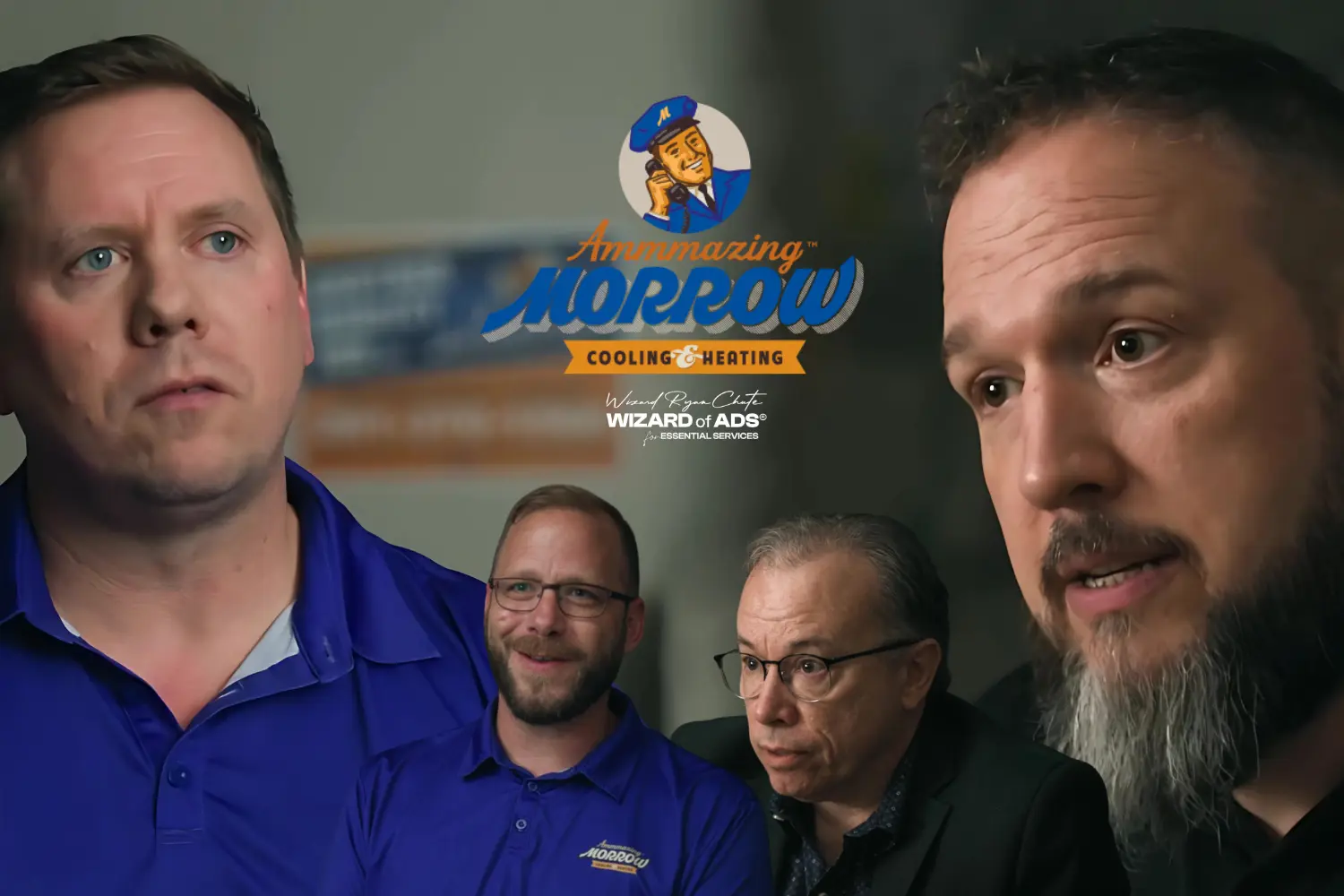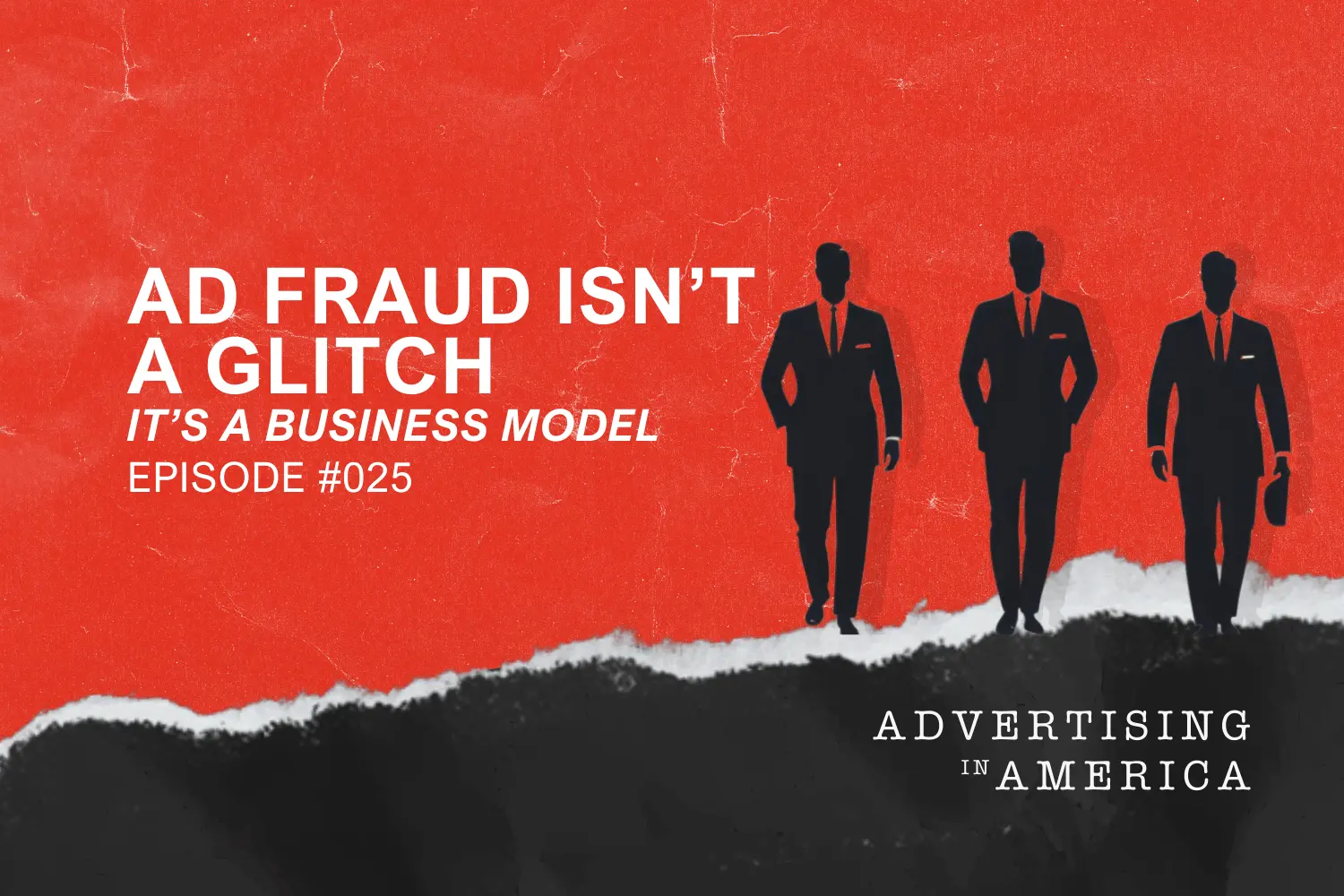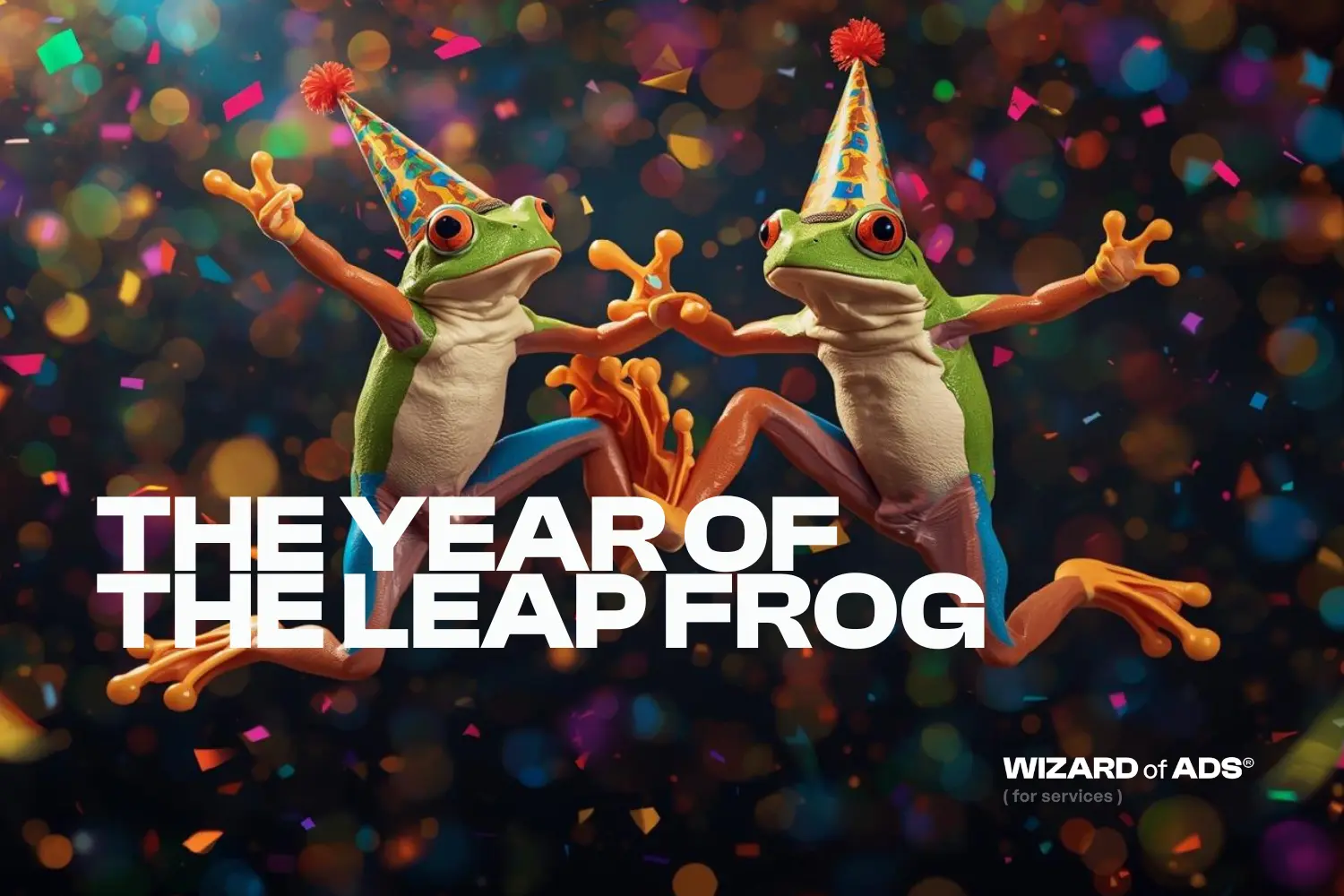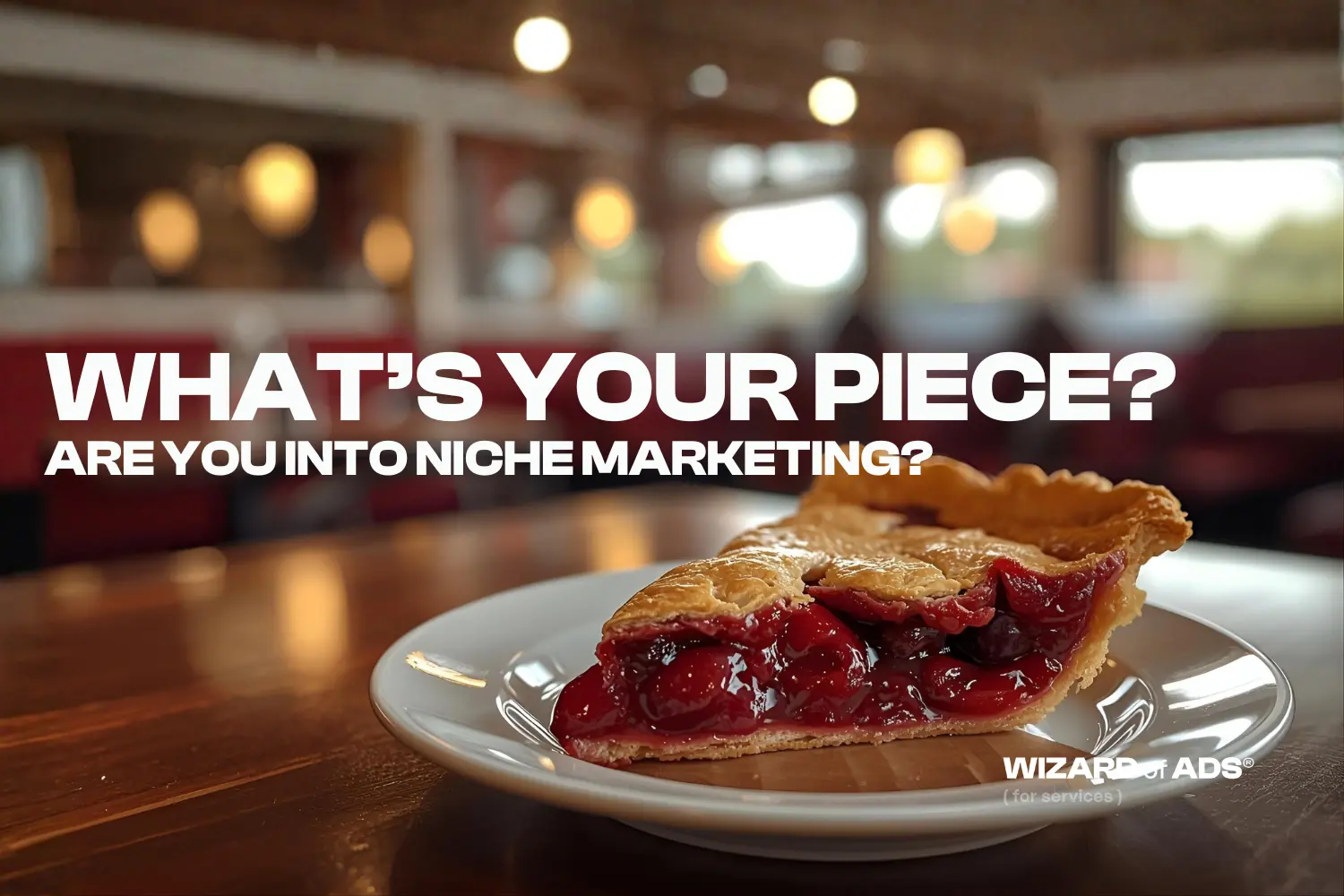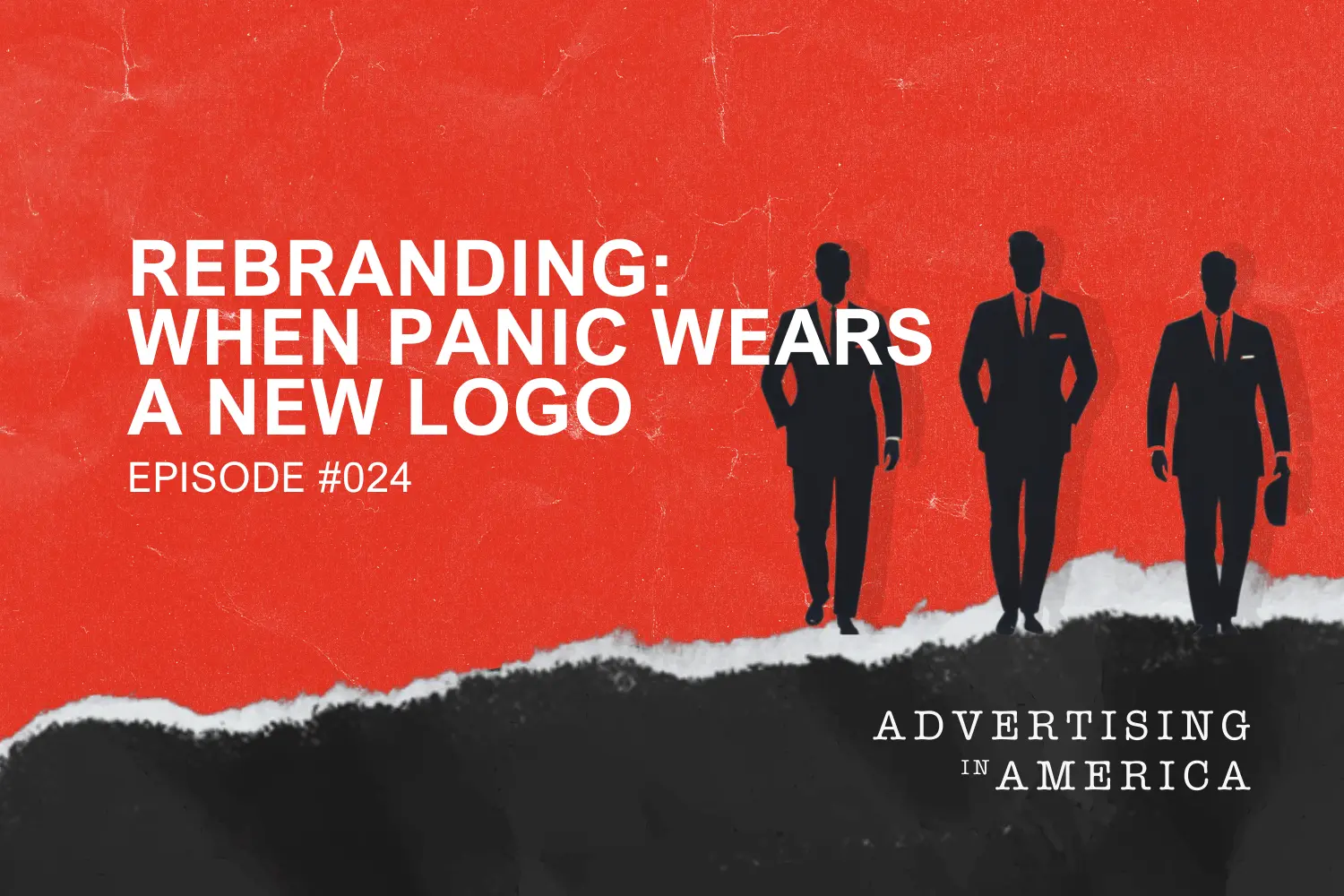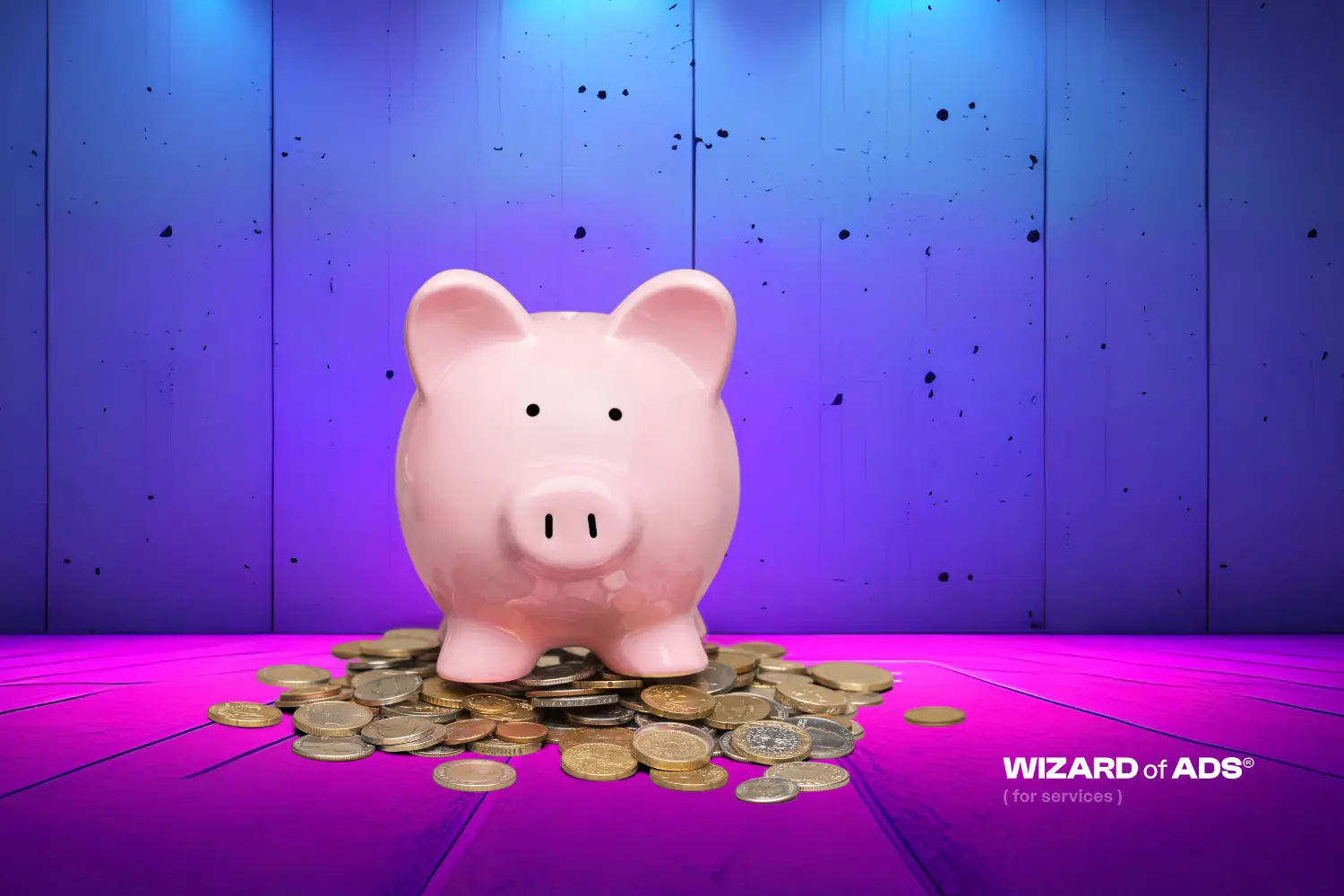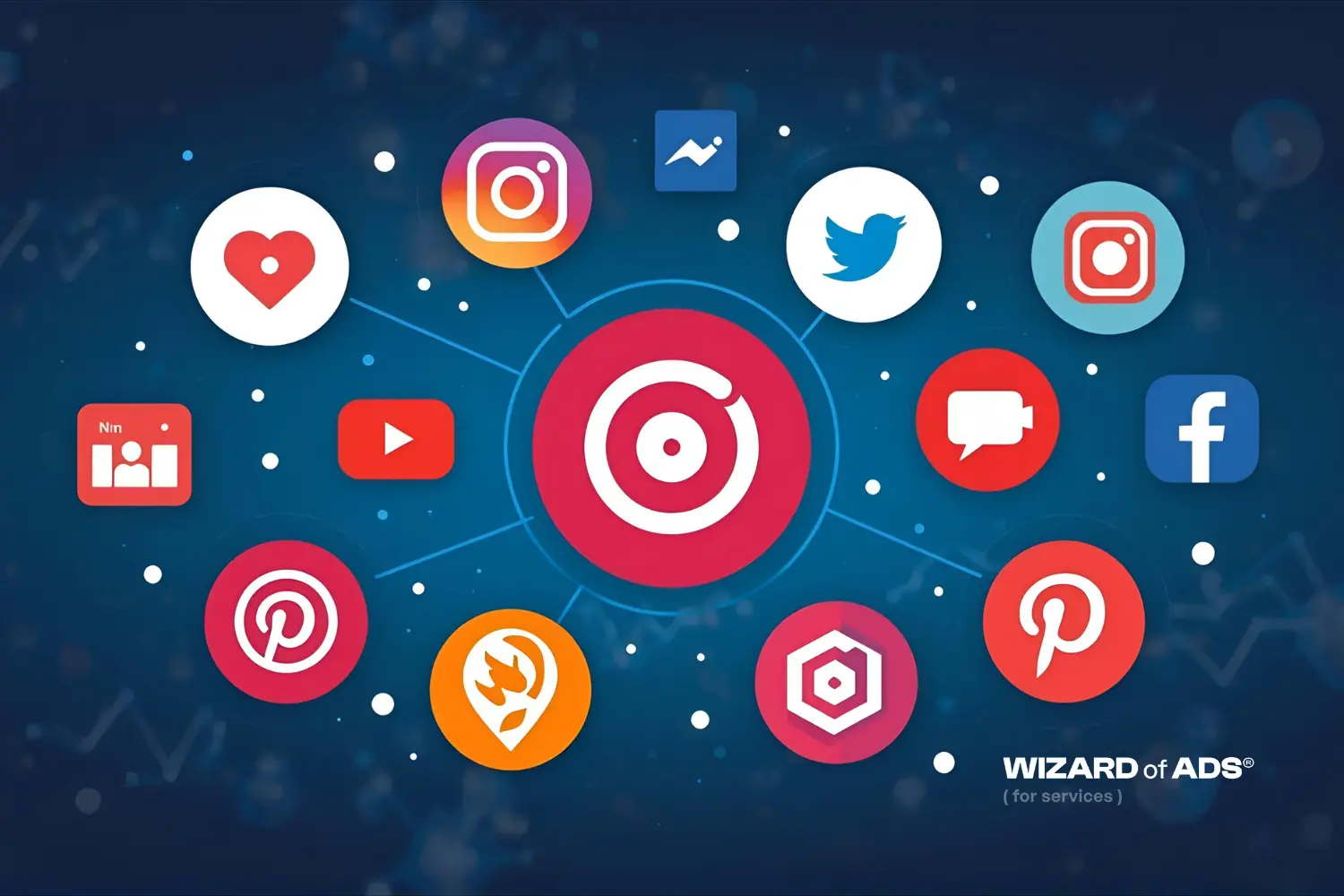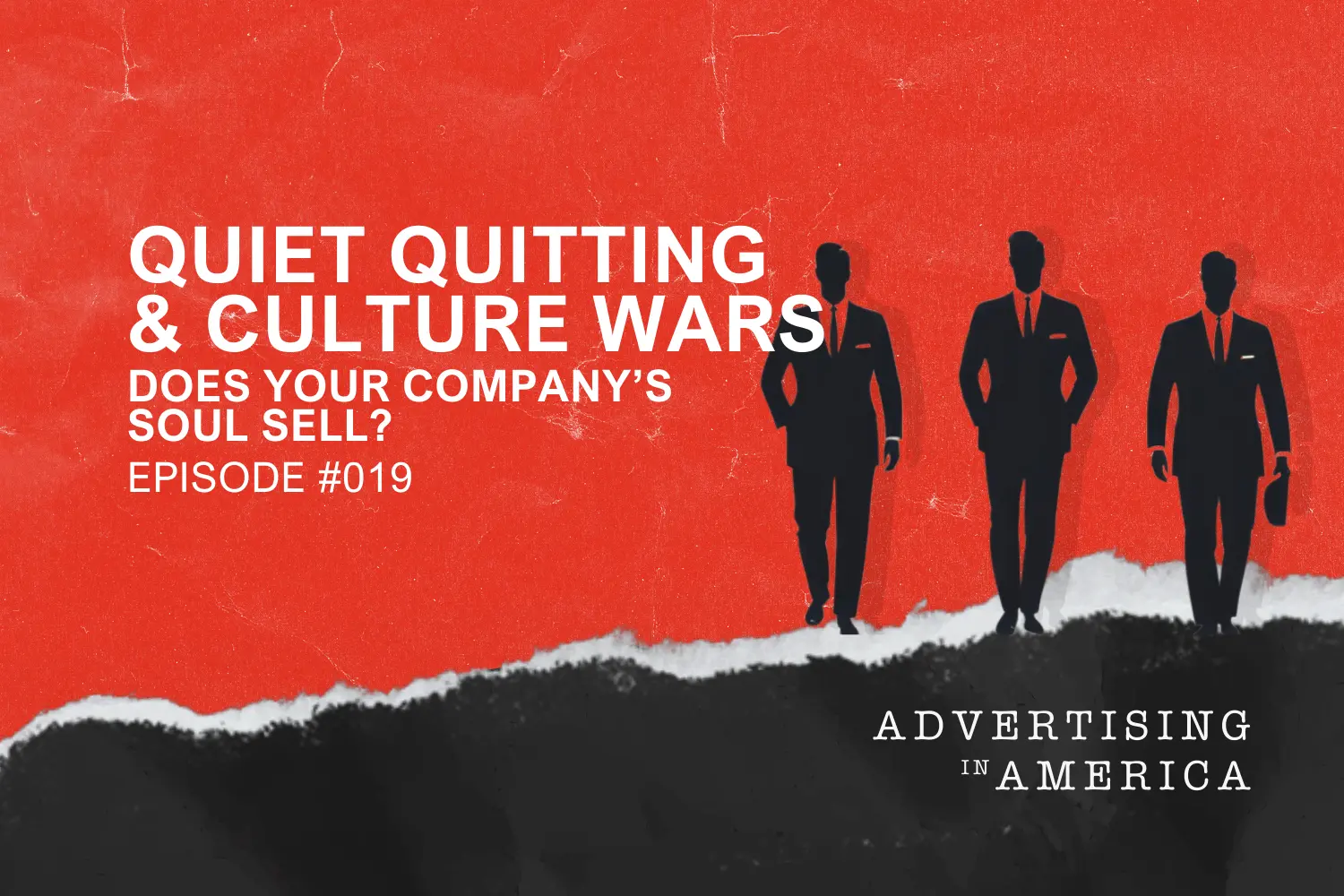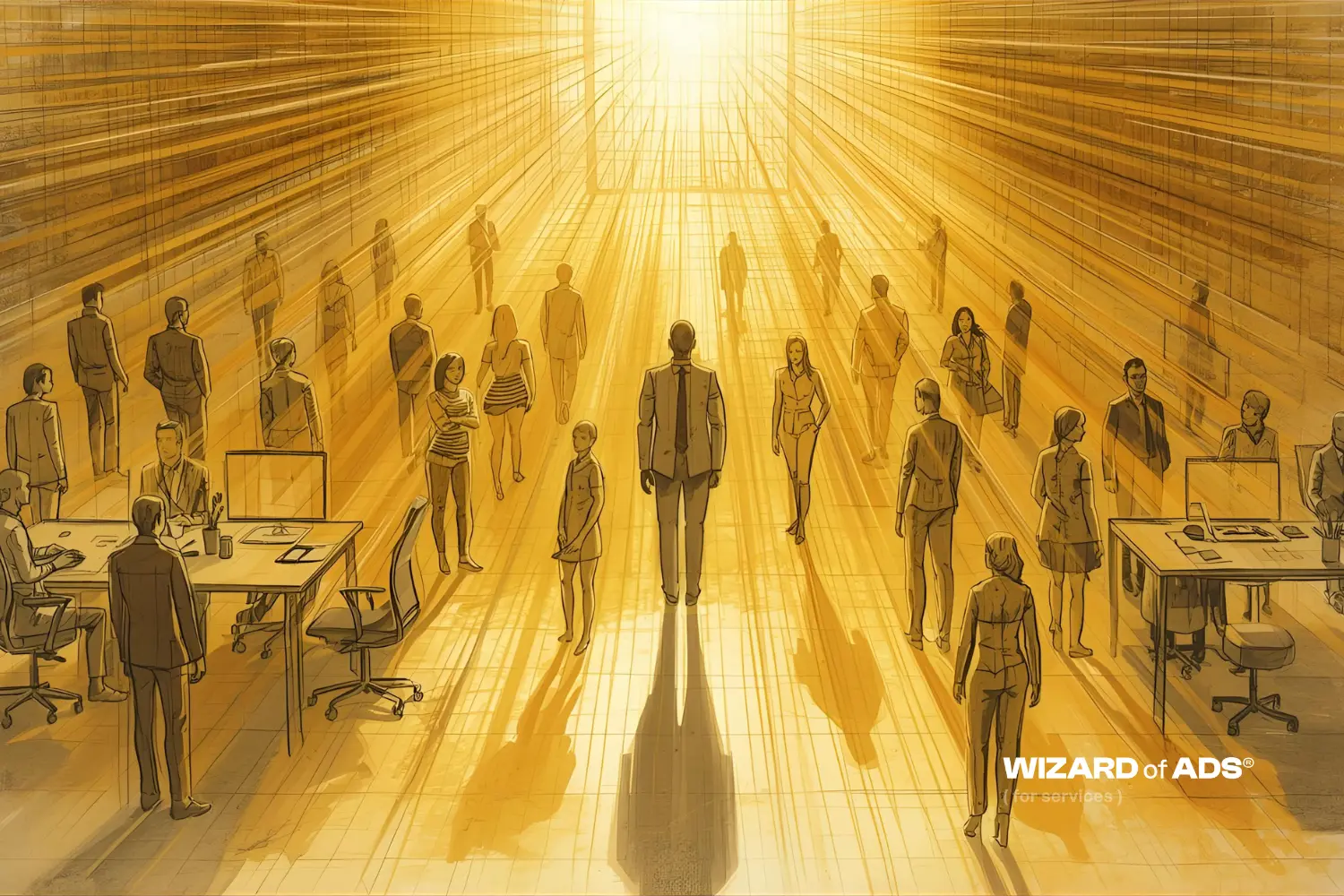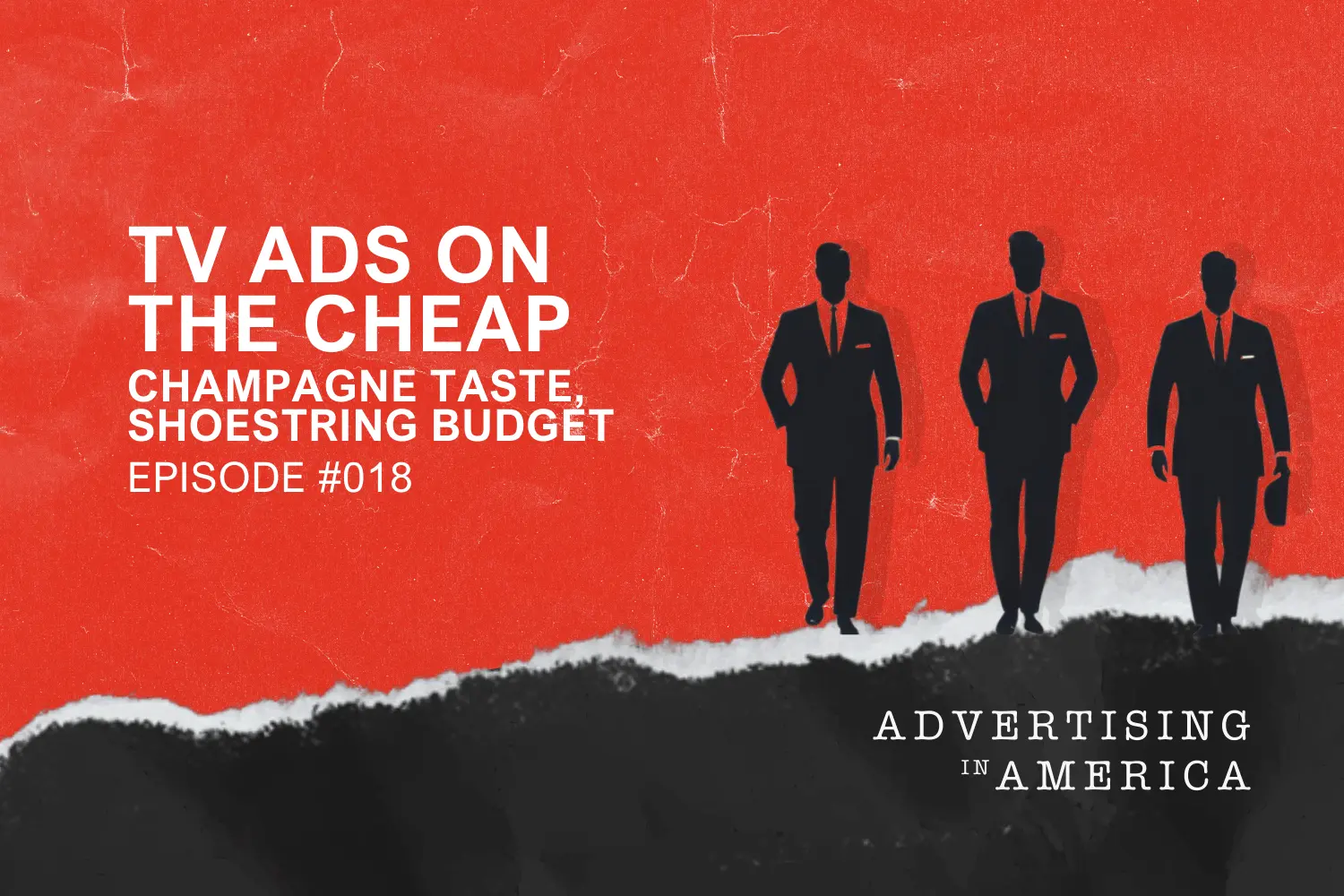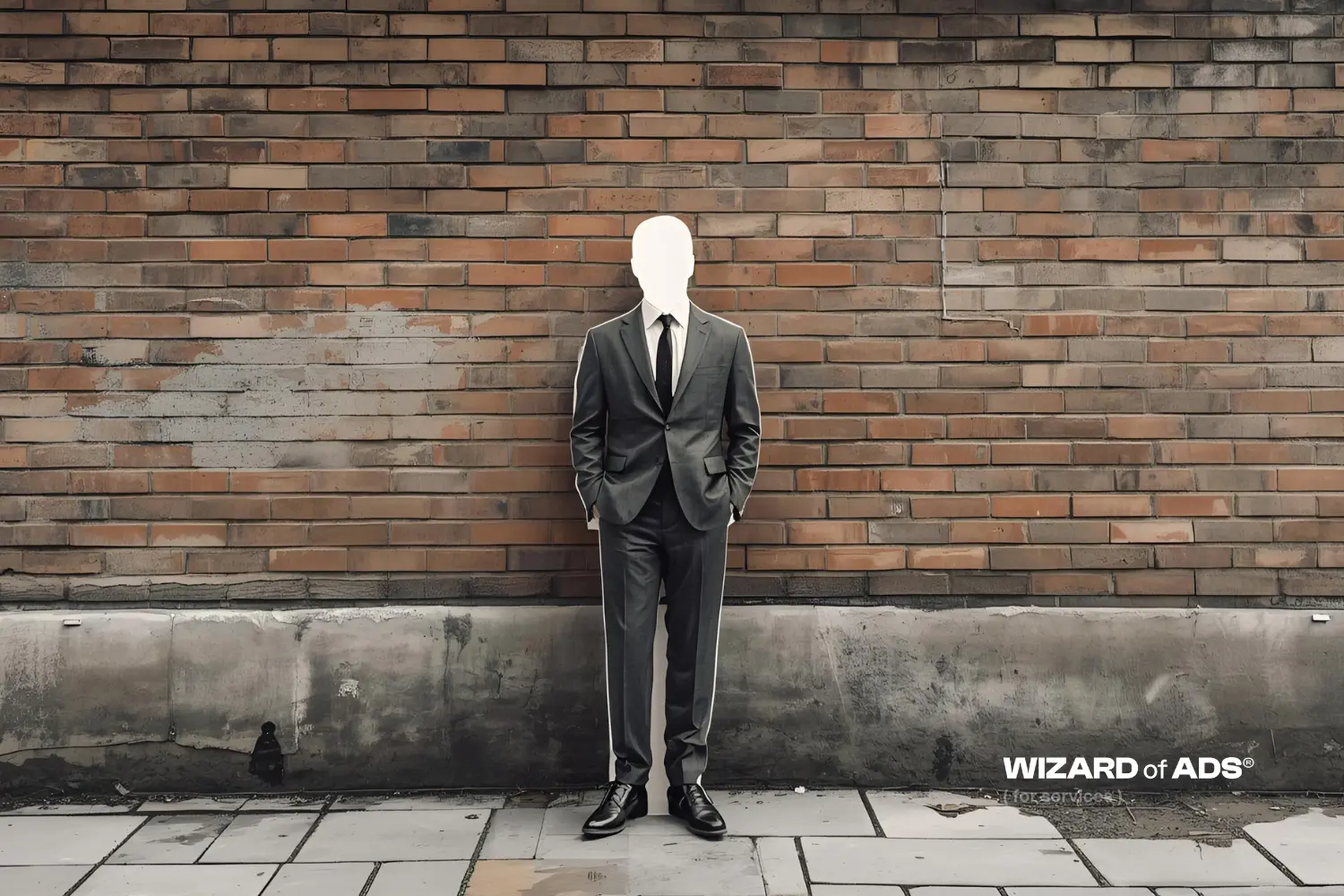
Let’s get something straight, kid—there’s no such thing as a perfect media channel.
If someone tells you otherwise, they’re either trying to sell you ad space or snake oil.
In this episode of Advertising in America, Mick, Chris, and Ryan fire up the mics to answer the golden question:
“Where should I spend my ad budget?”
The answer? Not where you think.
We slice through the fog of fear-based media selling, laugh at the myth of zero-waste targeting, and torch the idea that any medium is magic all on its own. TV, radio, digital, billboards—they all work if you do it right. And they all fail if you don’t.
Episode Highlights:
- Why 97% “wastage” might actually be the best investment you’ll ever make
- The difference between clever media placement and a killer message
- Why frequency beats reach every time
- How to build long-term brand love instead of chasing clickbait conversion
- And how to make your budget hit like Coca-Cola, even if you're not Coca-Cola
🎧 Hit play. Then stop chasing tactics—and start building a brand worth remembering.
Today, we'll cut through the noise and figure out where to spend your cheddar. In the 50s, radio was huge. TV made it less so by the 70s, the stronghold that radio had left was really just in cars as people drove to and from work. You could see that in the ratings.
When I worked on the Porsche business in Canada, we used to run glorious full-page magazine print ads, and the Report on Business Magazine. The one read faithfully by bankers and lawyers, and corporate executives. Running those ads, in that exclusive high-end magazine, it was still 97% wastage. Only 3% of that readership was technically our target audience.
Online versus offline, as we spoke about in earlier episodes, we talk about is social media is something where we look at it as only sales activation? Or do we look at it as branding? Well, it's both.
You can only get so far with clever media choices. You can fish in better waters, but you still need a good lure.
Ryan Chute: Where, oh, where should your ad dollars go? Choosing the wrong media channel means throwing money away. While the right choice could turn your brand into a household name. Today, we'll cut through the noise and figure out where to spend your cheddar. First to cut the cheese, Mick Torbay.
Mick Torbay: Which media work today and which don't? This is a question that we get asked a lot, and over the years, it won't surprise you. The answers have changed. For example, in the olden times, just about every grown-up read one daily newspaper regularly. My old man would read every page, and he wasn't that unusual. So, a big quarter-page ad in the local paper would get you a strong percentage of consumers in your market.
This is not to say there's no value in newspaper advertising today. It's not the same, and you'd be a fool to pretend that it is. There are simply more places to get news today, and although the New York Times has a digital version, that's the one I read, but there are not as many ads, and instead of the ads sitting on one page as you read the article on the other, now the ads are in the middle and you can easily scroll past them.
It's different. That's all I'm saying. I don't have any clients running long-term newspaper campaigns right now, which brings us to radio in the 50s. Radio is huge. TV made it less so by the 70s. The stronghold that radio had left was really just in cars as people drove to and from work. You could see that in the ratings, big listenership during breakfast and afternoon drive, and that ratings curve hasn't really changed much since the seventies.
Now that's gonna surprise some people because we have a lot more options for our drive to work entertainment than we used to, but you have to remember. There were options back in the 70s, too. Eight track tapes let you choose your own music cassette tapes, let you make your own mix tapes, and then CD players in the car gave us sound that was just as good as the radio iPods and phones gave us bigger playlists, but the numbers show that each of these new options simply replaced the previous ones.
Tons of people are still listening to the radio today, and I have plenty of clients on the radio right now. And remember, I'm paid on results. If radio didn't work, I would find something that does, which brings us to TV.
Yes, TV is suffering from cable cutters. Fewer people watch TV compared to the old days. But don't confuse fewer people with nobody. That's dangerous. Nielsen knows exactly how many people are still watching regular old television. So the only question is how many are there? And how much does it cost to reach them three times a week? Remember, we don't need to reach everybody. We need to reach half of everybody because they will tell the other half, and you can easily reach half of them with TV.
Digital, well, of course, digital works really well too, but only if the consumer is ready to make a purchase and has no preferred brand. Which leads to a search. With digital, everything begins with a search. And for me, if you're waiting for the customer to make a search, that means you're already too late. I wanna win the hearts and minds of the consumer before they search for your product or service.
McDonald's doesn't need an online campaign 'cause they're already on the short list when we want a fast burger. We don't need to search “burgers near me” to know what a Big Mac is. That's what I want my client to be. The one that's thought of first and liked the best before a search is even considered. I wanna skip the search like McDonald's does, and you can't skip the search with digital.
All of these media work well when you buy them properly, and you have a compelling message.
Ryan Chute: Mo money, mo problems. The more you wanna grow your company, the more people who need to know not only that you exist. But you are the best choice. Chris, what do you think?
Chris Torbay: Listen, all media channels are a blunt instrument. A bunch of people you want to reach mixed in with a bunch of people you don't.
Media companies that try to position themselves as otherwise are creating false hope. There is no holy grail for your brand. When I worked on the Porsche business in Canada, we used to run glorious full-page magazine print ads in the Report on Business magazine. The one read faithfully by bankers and lawyers, and corporate executives, and running those ads in that exclusive high-end magazine was still 97% wastage. Only 3% of that readership was technically our target, except it wasn't. Because the other thing we know about Porsche buyers is that they've wanted one their whole lives.
They just had to get successful enough to finally buy themselves one. But they probably had a poster of one in their bedroom as a teenager, and they weren't a rich banker back then. So, however we've reached them all those years, the media contributed too. I've mentioned before that Coca-Cola used to say, “If it moves, sponsor it and if it doesn't, paint it red”.
That meant they wanted to be everywhere, and they advertise everywhere too, on TV, radio, cinema, pre-roll ads, transit, billboards, you name it. Because their target is everyone. Thirsty people.
And the truth is, your target might be closer to everyone than you think. If you run a jewelry store, your target is everyone who likes to look pretty, as well as everyone in love with someone who likes to look pretty. That's quite a lot of the world. If you sell heating, cooling, plumbing, or electrical services, your target is homeowners or people who want to be basically adults, 18+.
This search for the right medium is what leads to media being created for no other reason. Cigar Aficionado Magazine doesn't exist for all the Tobacconists hoping to read interesting articles. It exists for the high-end whiskey retailers who want someplace to put their ads because, hey, if people can afford fine cigars can also afford fine whiskey. It's perfect for our target.
Dogs Today and Modern Dog are magazines that only exist because advertisers will pay to advertise in a magazine read entirely by dog owners, but that search for zero wastage isn't nearly the best way to reach dog owners in America. Mass media is, even with all the non-target, non-dog people, who are also watching, dog owners are everywhere, and everyone.
Don't advertise your engagement rings in Engagement Ring Quarterly because that's where all the people who are interested in engagement rings are. They're in the world. Advertise in the world, you'd do better to concern yourself less with finding the right medium and more with finding the right message.
What makes you a better source of engagement rings than the other jewelry store? Why will my dog prefer your dog food to the stuff we feed her? Now, why should I spend a hundred bucks or a thousand bucks on this single malt and not that one? Sure. Don't put up a poster for Rolexes at the unemployment office. Don't advertise Viagra on Dora the Explorer. Fish where the fish are, but you can only get so far with clever media choices. You can fish in better waters, but you still need a good lure.
Ryan Chute: Condoms, Chris on Dora the Explorer, possibly a good idea. Let's discuss some fun places to advertise when we get back from this commercial break.
Ryan Chute: So let's break this down into key considerations, mass versus targeted media, online versus offline channels, and the external tug of war between sales activation and brand building.
Mick Torbay: Well, one of the things that I like to do is I like to meet the client, the business owner, where they're at, and one of the things that we're very often asked very often, early in our relationship with new clients is “what media work and which don't.”
So we phrased our question that way, and that's certainly how I phrased my initial rant. But there's an inherent error in the question itself because it kind of suggests that some do and some don't. And that kind of thinking can lead you down a very, very terrible path of deciding that. That there are some that do work and there are some that do not work. They all work when done well. They all fail when done badly.
Ryan Chute: Right, right. Absolutely.
Chris Torbay: Well, and it's not to keep coming back and making the boogeyman out of digital, but it's also a question that's getting asked more and more because digital in various contexts will offer you a kind of targeting that is very, very specific.
And as we've talked about in other programs, often that targeting comes later in the search funnel, right? So if somebody's air conditioner broke today and they Google “air conditioner repair near me,” boy, digital will search for people who are targeting, who look like they're going to make a purchase today. Whereas mass media, we'll create a brand that people like the best and are and are most predisposed to think of when a year from now something goes wrong and they say, “Hey honey, who should we call? Well, there's those people whose ads we like.”
And so again, there's a thing that happens because digital does offer some sort of targeting, or because you can run a banner ad on the goldfish website, boy, you can really talk to goldfish owners specifically whereas if you advertise on, you know, Abbott Elementary, you're gonna get the amount of tropical fish owners that exist in the world.
So it's one of these things where people now have kind of unrealistic expectations of how targeted they should be able to be, because there are a couple of opportunities to be very targeted. But that doesn't mean that that's the best choice or sort of strategy.
Ryan Chute: Well, and it comes down to what I understand it to be, two things, right? Targeting is ideal for a couple of reasons. One, to get your message out to the people who are looking to buy your thing right now. And two, to target an area where you may not have the budget available to target.
The mass, right? And you just can't afford to do it equally as much. If you live in a great big city and you run a $3 million home service company, you're not gonna want to target the whole city in the first place because you're gonna spend more time behind a windshield, then you're gonna be in customers' houses.
So it does come back to the operational strategy that the business has available to them at the time with their budgets, resources, and capacities. But it's also a question of what are we actually targeting here?
There's this idea that we're trying to get targeted results out of mass media. We're trying to get a sales activation message out of mass media, and that's not practical. Online versus offline, as we spoke about in earlier episodes, we talk about podcasts, is that online or offline? Is social media something where we look at it as only sales activation? Or do we also look at it as branding?
Well, it's, it's both. It's not an online or offline situation of lead generation versus brand building. It's both. In those situations, and where you leverage the media channel comes into, how does the media channel get consumed? What's the temperament around that channel? What's the intent around that channel?
Mick Torbay: Well, we also tend to imagine that certain people use certain media and don't use others. And that again is an, there's an inherent error there. Well, does, does our target consumer watch TV or listen to the radio or go online? Well, the answer is yes. And, every time they come up with a new medium, it's easy, and it's almost always a very targeted one. And, the way that they sell it to you is they say, well, this is how many people are using this new medium?
For example, I remember when in a ways the traffic map system gets you to work when it first started selling ads where they would do is they knew where you were going and if there was a Dunking Donuts on the way to your, to your target destination, they could say, “Hey, do you wanna stop and get a donut?”
Okay, great idea. And then they would sell that by saying, “This is how many people are using this product, and therefore, if you want to reach them, this is how much it costs.” And if you choose not to use my medium, you won't get them. It's like, “Well, you know what they're doing in their car, apart from using Waze, they're listening to the freaking radio.”
Like we think that every time someone invents a new medium, we add more people. No, we don't. There's the same amount of people as there's always been. It's just every three weeks we figure out new ways of advertising to them. But that doesn't mean that if you don't choose this medium, they are 'ungettable', they're absolutely.
Chris Torbay: They're listening to the radio on the road. They're watching the billboards go by on the road. They got signs on the road.
Mick Torbay: All the stuff that's been there is still there
Chis Torbay: And they watched the TV ad last night and thought, you know, “I think I might get my coffee there instead tomorrow. Why not?’
Mick Torbay: Absolutely. All of those things.
Ryan Chute: And that's seduction is really perpetrated in marketing class and marketing schools at universities because they're orienting their strategies around the Fortune 500, the Fortune 100, where budgets are seemingly endless, and you have this, this access to the omnichannel presence.
Small businesses, three to $5 million have a budget, they have payroll to meet this month, twice at least. And ultimately, it's gonna boil down to where do I spend my money? And, the answer to that is, wherever you spend your money, don't spread it around so thin that you're talking to very, very few people very infrequently or a whole bunch of people too.
Chris Torbay: Yeah, that's an interesting point. If you're Coca-Cola, you can. You can be a dominant media purchaser in every medium, right? You can buy tons of TV, tons of radio, tons of outdoor, tons of everything. But if you're a smaller player, then pick a medium, help pick a couple of stations within a medium and be a big player on that station so that the people on that station see you as a, you know, and this is why we come back to region. It's about reach and it's also about frequency and reach as many people as you can, but only at a frequency that it becomes valuable, right? You know, three times a week, something like that, where if you are a listener to that station, this is one of the regular advertisers that you hear, and then they become in whatever amount of the population that is. You've got them for sure, though.
Ryan Chute: That's the secret sauce of the Wizard of Ads. And it's on page, I believe 122 of the Secret Formulas of the Wizard of Ads. You are going to have incredibly more potency reaching the same people with a hundred percent of the message, rather than a hundred percent of the people, at 10% of the message.
Chris Torbay: A little sprinkle here. And this is, Mick tells this story a lot, so I'll say, I'm gonna steal it from you, which is a lot of times when people say that a medium doesn't work. It's because they did a half-ass job of it. They say, “Oh yeah, we tried radio, but it didn't work.”
Well, as it turns out, the radio station then offered them a special price for a 13-week flight. They did one ad that they wrote themselves, and the DJ read it over a piece of stock music, and they ran it for 13 weeks. And guess what? It didn't do anything. Well, of course not, you know, and, and they probably gave them leftover media space on the overnights. And so it didn't even get that much of a, but now they think they tried radio, quote unquote, and it didn't work.
And I'm sure the same thing happened with, you know, a community magazine and a something else, and a something else. And so they've written off all these things because they didn't do a good job of it. They didn't own that medium. They didn't, they didn't have a good message in that medium, but they didn't do it the right way.
And now they've written it off unfairly.
Ryan Chute: And, frankly, that is the fault in my deepest of opinions, that's the fault of the media sellers who are
Chris Torbay: Sometimes…
Ryan Chute: Who are almost always the ones trying to convince you of your marketing strategy, when they're not actually giving you is one ounce of strategy, but a tactic that may or may not work.
There's nothing more frustrating to me than seeing a whole bunch of outdoor signage for a company that doesn't have a supporting auditory reinforcement mass media campaign, because you're literally wasting money on these billboards and these park benches and bus stickers that don't actually drive any evocative emotion.
Mick Torbay: Well, and there's no particular medium that has a monopoly on that. I mean, any advertising medium has to get sold. And so, therefore, you have to bear in mind that there are sales techniques that people use, and like any major decision that anybody makes, it's based on one of two things: hope or fear.
And so you can, you can sell with hope, and you can sell on fear. And the fear that they do is if, here's how many people are availing themselves of my advertising medium. If you don't buy it, therefore you're not getting them.
Bullshit. That's not how it works. And everybody does this.
The radio stations will do this. The radio station will say, “Well, this is how many list, how many listeners you won't get if you don't advertise on my station.” That's not true. Are you a classic rock station? Well, let me guess. Is there another classic rock station in town? Well, people switch back and forth between your station and the other one.
I don't care who you are. Yeah, that's the way. That's the way.
Chris Torbay: And when the game's on, they're on the sports station.
Mick Torbay: They're on the sports station. So you can get everybody somehow. So there's that, that fear, and we, we know people buy based on emotion. So they sell based on emotion, and they will say whatever they can to get you to buy their thing, even though that might not be the best thing for you. Which is why we are media agnostic. We don't care what medium you're on. We want you to make more money, and we choose whatever medium we can to accomplish that.
Ryan Chute: And it's about spending those limited dollar resources, more potently.
We'd much more rather have a concentrated effort going to the same people. That is going to get you further down the road faster, and then be able to build off of that backyard base that you're building from, regardless of the channel. Whether it's social media, whether it's radio, or whether it's television is inconsequential.
What matters most is that the message is right and the frequency is right for the amount of budget you have, is the only thing that's gonna change. Your budget is how many more people you wanna reach. So that function is the measuring stick that we need to look at, not the other way around. We hope to reach so many people on billboards. There's a hundred thousand people driving by a day. Well, who cares? Most of them aren't even looking at your thing. And if you're selling a home service, they don't need your thing right now when they're driving by that. Why in the world would that resonate with them in any other way than to be a of color up on a board somewhere that's completely invisible otherwise.
Mick Torbay: Now, this is not to say that there's no way of being strategic in your media buys because, for example, there's an interesting niche that television has that can't be accomplished with radio, as an example, and I'm talking about specifically cable TV.
When you buy radio, you're buying, we're broadcasting to a very wide area based on how far the signal goes from their transmitter, and everybody who hears your ad will hear your ad if they're within the zone of how far that transmission goes.
With cable TV, now television's generally more expensive than radio, which is why we like radio so much, because it generally costs less money to reach people more often. But there's this one little trick with TV where, let's say you're in Atlanta and you sell roofing, but for whatever reason, you only serve half of the city. Because you're just not big enough to serve the other half. Radio can actually hurt you there because you're advertising to half the people who are listening to you, you can't serve them because you just don't have enough trucks.
Chris Torbay: If they call, you gotta turn 'em down.
Mick Torbay: Exactly. And, so that's not just wastage, it's not just a matter of you're, you're talking to people who are not potentially your customer. You're actually potentially pissing them off when they want you.
They like you. They think of you first. They want to hire you, but you can't serve them. So now you're actually gonna annoy people. You're paying money to piss off half the city you don't want to be in a position where that's happening, but what you can do with cable TV, you can literally bring your message by zip code.
You can say, this is where we operate, and this is where our commercial will run.
You can't do that with billboards because people drive around the whole city. You can't do that with radio because people can pick up your signal everywhere else. That's one example. There’s a few of these, and I'm not a media buyer, but people who are really good with media will help you navigate that world. But there, there are a few examples where you can be strategic about your media buy. My example with a business that serves half the city, radio is the worst thing you could possibly do for that reason.
Chris Torbay: Yeah. And you can target within that too, which is, you can buy ESPN on cable, or you can buy HGTV or something on cable. And so you're talking to people who are interested in homes, or you're talking to people who are interested in sports. And if that aligns with your sort of customer base, then you can target that way. But, but also remember, and people sort of get excited about that. “Oh, well, if a lot of our customers are also sports fans, you know, that's why we put the beer ads on the sports things because a lot of people who watch sports also like beer.” Well, a lot of people who run in investment brokerages also drink beer.
Mick Torbay: And they get thirsty as well.
Chris Torbay: And some of them also like football. So, you know, these things are not necessarily mutually exclusive, but you could also reach that person with your beer ad in something that's aimed at bankers.
It's interesting, and so just because I think sometimes there is that fear of wastage, right? That I'm advertising to all these people who aren't my target consumer. And so isn't that wastage? And it's like, well, it is, but if it's getting you, who is your target consumer as well? Then it's the cost of doing business. It’s a thing that you do.
The one that I learned this years ago and it, and it still gets me, is, I dunno if you've ever seen a TV ad, and sometimes you see like 60-second TV ads for General Electric or Siemens or Bombardier, and it's like there's a 60-second commercial on a like a major thing, and I've learned about those, which is those ads are aimed at like 200 stockbrokers in America, you know? Which is to get you to think about General Electric as an investment. And the best way to reach those 200 stockbrokers or bond traders or whatever it is, is mass media. 99.99% wastage. But you'll get those 200 people. So take your lumps, you'll get the people you're after.
And that's why I say on some of these other things, if you're selling dog food, put it on Abbott Elementary, half the people are cat owners and are tuning you out. But you have an incredible volume of dog owners who are also watching. And that's a valid investment as compared to getting 99% accuracy on a very small run dog magazine that nobody reads. But the people who do are all dog owners.
Ryan Chute: So we're talking about emotional environment, or the intention of the environment, of what the person's disposition is, who is going to be looking at that. They're also dog owners, but they're also kind of like, they're looking intentionally more so, you're going to get a higher weighted value.
Chris Torbay: But again, and we've talked about this, you know, what's more important is your message. I think if I were running an ad for a dog food, I would run a different ad in the dog magazine than I would run on the Super Bowl. And, it's almost what you were saying between brand and activation, right?
Which is somebody who's, who sees your ad in a dog magazine. Maybe you make that a more informational ad. Maybe you talk about things that you wouldn't talk about. Whereas in a broad scope, medium, you tailor the message to what the medium is. And when you get the people who are keeners about it, and they're in a certain space because of how engaged they are, then there's probably a specific message for that person as well. And it's the combination of those two things that makes it more effective, not just this is a better medium, quote unquote.
Ryan Chute: So as we talk about having the past talked about, targeting is one of the ways that you can target without targeting where you can speak to as many people, there's never been a time that we've ever seen somebody who's the wrong person reached with our message bankrupt a company like it just, that's not how it works because mass media is such fractional amounts of money per listener. It's not even a fraction of a penny. So well, it is a fraction of a penny. It's very, very tiny. So why does that matter? It matters because we can reach these people, we can connect with them, and if they're not the desired recipient, the targeting in the message will actually be received and carried forward and shared, as you said, with the other half of the population
Chris Torbay: Or it's brand building, and next year you're gonna get them. Yes. They're not at the bottom of the funnel. They're not looking to purchase a water heater today. Or a new iPhone today. But you talk to them all year. Then, when it comes around and they are ready now you have reached them. Now that investment pays off. That was not wasted money. It was back then because they didn't convert. If that month you needed sales, if that day you needed the phone to ring. Okay, that's “wastage.” But a brand-building perspective, it’s not.
Ryan Chute: It’s compound interest. It's compounding because you're building the business of many years from now. And that's really where we shift into this kind of concept of the long-term brand building and the short-term, and what devices, what media channels are best used for that? TV and radio Billboard, all obviously the best for brand building because it's repetitive, it's echoic. It's going to show up over and over and over again. It's also auditory level. It's going to have a higher impact. We also have social media campaigns, but on a broad reach, impression-based campaign, not a click campaign. That's the only affordable way of doing it. Also, targetable.
These are the things that we're testing right now with the help of Ryan Deiss at Digital Marketer, who's teaching us and testing these theories out on how do we leverage social media in a way, like mass media.
Mick Torbay: But we need to remember that anytime we're talking about media, one media choice versus another, as a business owner, if you're talking about which media should I choose, bear in mind the discussion you're having is, “Where do I want to say it?”
Anytime you're talking about budget, how much money you're gonna spend, what the question you're asking or answering is “How loudly or how often am I going to say it?”
It's how many. It's how many, it's how often, and where? How are we gonna say it? How often, how loudly are we gonna say it? Have we forgotten what we're gonna say? It's the message, it matters which media we use. But say it out loud with me. We're talking about how I'm gonna say it.
But are you sure you know what you're going to say? Because what you're gonna say matters more than how you're gonna say it, where you're gonna say it, to whom you're gonna say it, and how often and how loudly you're gonna say it.
Ryan Chute: So, think about this from the Simon Sinek Golden Circle standpoint. The how we're gonna say it is, is the whatever media channel we choose; the what we're gonna say is the actual communication message.
Mick Torbay: Why you matter.
Ryan Chute: And the well, and the why, is going to inform what we say. So the why is we're gonna do this because we're gonna grow our company to this, and we're this, and we're this. The why is what sells, and it's gonna sell more effectively when we get our why. So Simon Sinek, back again to the Golden Circle, get your why, right? Start with the why. The why will inform your what, which is the message, and the what will inform which channels we can do it most cost-effectively on.
So this is, this is all very much the same information that you've seen, just perceiving it from different areas. And that matters because we're really trying to maximize the output of your marketing dollars, because they are limited, that you don't have an endless infinite budget, and frankly, you don't have so much money that you can apply to just pay-per-click campaigns and short-term immediate results that you go out of business trying to chase the almighty lead at $200, $300, $400, $500 per lead for these high level keywords.
What you can do is bring that down so dramatically much and shift more of your message to brand building, to actually giving a reason to know, like, and trust you before they get to Google.
Mick Torbay: And get you on the short list before they're Googling your category, right?
Ryan Chute: Because if you're not on the short list, you're on the long list, and you're no different than anyone else, there's literally nobody else that would stand out any better than you, except for the ones that have worked on their brand.
Right, and we're not talking about truck wraps and logos here. We're talking about auditory storytelling words. If there's no narrative, if there is no editorial, then there is no context to the pretty pictures that you're seeing wrapped on trucks or sitting on billboards. Yeah.
Mick Torbay: And you're not answering the question, why you?
Ryan Chute: The what is a billboard is a channel, a truck wrap is a channel. A website is a channel. All of these things are the how you do it, but none of them are answering the question of why. And, certainly, none of them are saying what you do beyond what anyone else would say fundamentally.
Chris Torbay: The Differentiator.
Mick Torbay: And don't put more effort into, how am I gonna say it, than, what am I gonna say?
Ryan Chute: And, and frankly, why you're gonna say it? Because until we know why, we're gonna say it. We don't know what we're gonna say until we don't know what your values are. Your mission is your core values, your beliefs, the things you stand for, the things you stand against, and what you're trying to achieve.
Are you trying to be a multinational company? You're trying to be the best guy in town? Are you just trying to run a happy $5 million operation? All of those are okay. Those are all success. It's about doing it at the best possible level to get the best possible results for what you define as success.
So the strategy really depends on the brand's goals and the competitive landscape. We'll tie a bow on what this means for your business after this message.
Ryan Chute: At the end of the day, where you spend your advertising dollars is less about finding a magical medium and more about understanding your message, your audience, and your goals. It's not about precision so much as presence, and not about targeting perfection, but ensuring that your reach and repetition is embedded your brand, in the minds of the audience.
Video and radio dominate for embedding long-term emotional connections when the right frequency is achieved. Intent-based search and sales activation offers are great for short-term goals, but no medium will do the work for you if your message isn't compelling.
The best advertising strategies blend media channels, measure impact over time, not just leads and adapt as the landscape changes, the key? Think like Coca-Cola, be where your people are while targeting helps. Storytelling and emotion trump clever placement every time.
So, where should your ad budget go? Everywhere your customers live, think and relax. Fish where the fish hang out and use a better lure.
Thank you for joining us on Advertising in America. We hope you enjoyed the show and captured a nugget of marketing magic. Wanna hear more? Subscribe, leave a review and share this podcast with your friends. Do you have questions or topics you want us to cover?
Join us on our socials @advertisinginamerica. Wanna spend your marketing budget better? Visit us at wizardofads.services to book your free strategy session with Wizard Ryan Chute today. Until next time, keep your ads enchanting and your audience captivated.

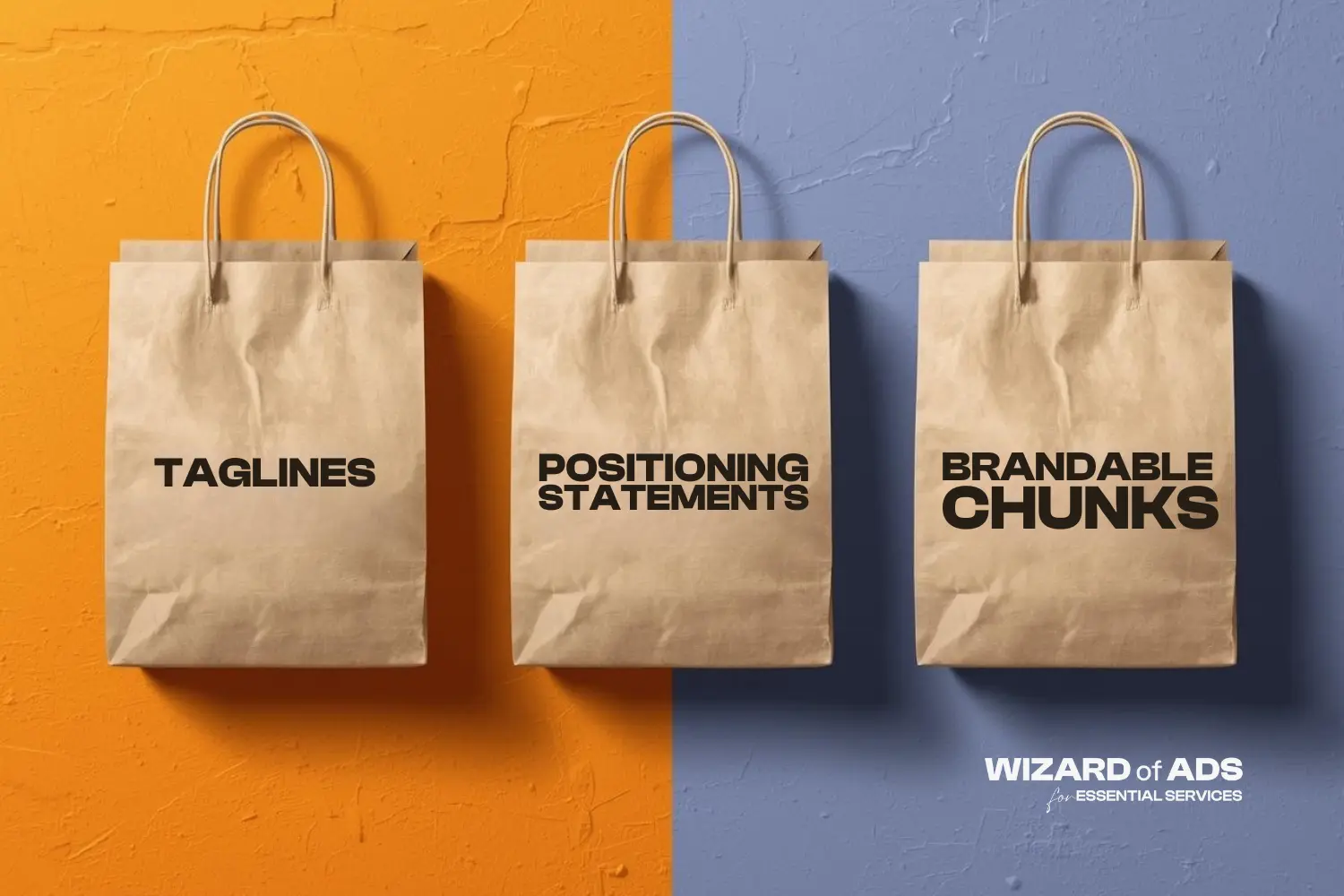
.webp)
.webp)
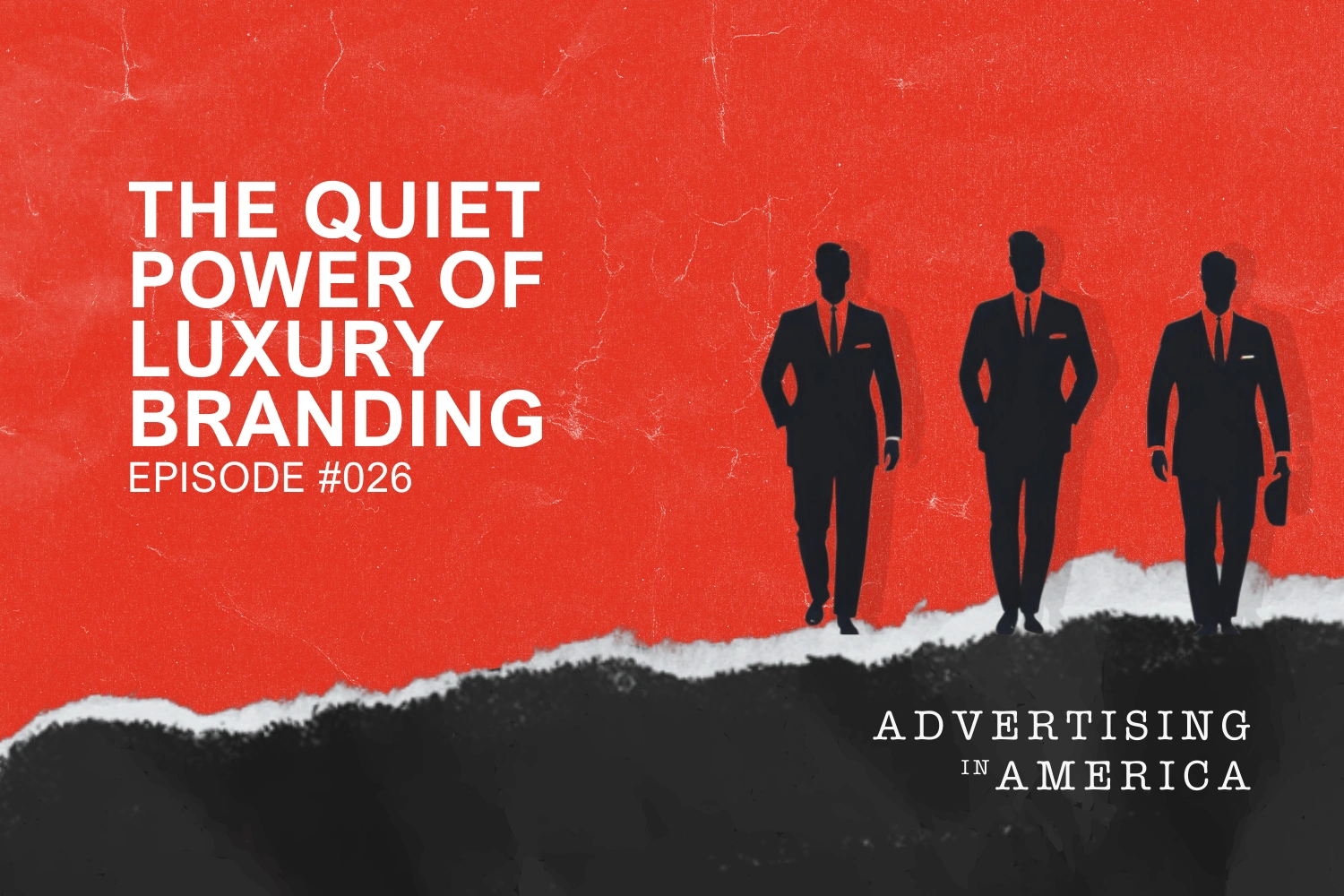
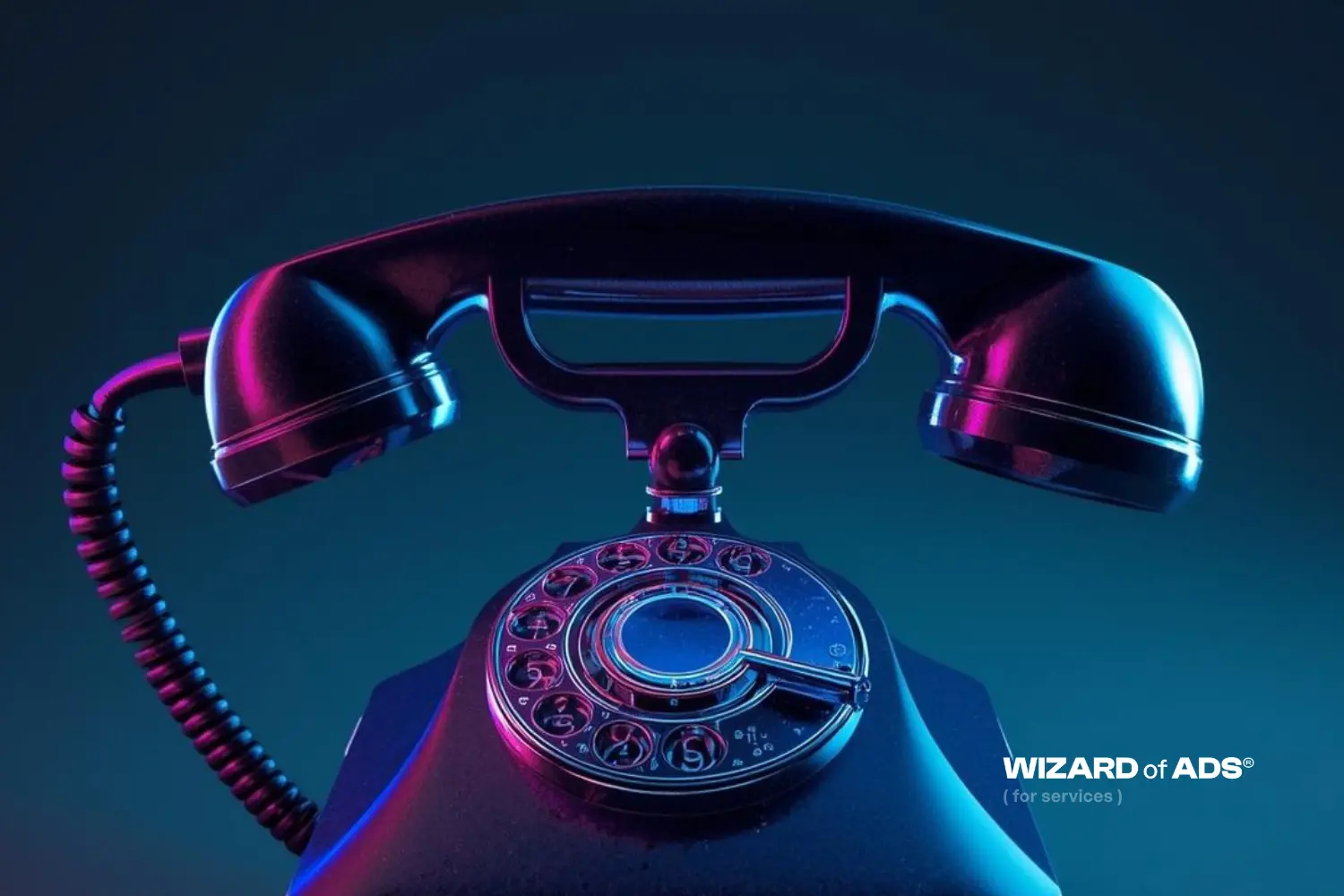
.webp)
.webp)
